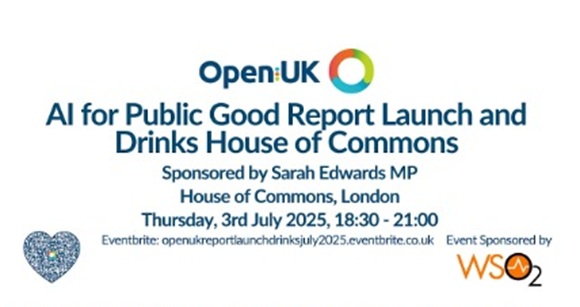OpenUK Public Good AI report 2025, good (could do better)
A balmy summer evening in London and a need to champion open source software, open platforms, open data and open computing at large can only mean one thing.
That thing is a chance to celebrate the OpenUK Public Good AI report 2025, which the organisation did at a reception held on the river terrace at the House of Commons this week.
Grand dame of openness, chef du platform and all-round professor of unbridled information engineering Amanda Brock (her official title is CEO for OpenUK) joined other key figures from the organisation to welcome attendees to the event and explain why the open source ecosystem around AI presents a huge opportunity for the UK.
This is not least because AutoGPT is based in Scotland.
What is AutoGPT?
As TechTarget explains, “AutoGPT is an experimental, open source autonomous AI agent based on the technology behind ChatGPT. AutoGPT autonomously chains together tasks to achieve a big-picture goal set by the user. It automates the multistep prompting process typically required to operate a chatbot such as ChatGPT. The user provides one prompt or set of natural language instructions, and AutoGPT works by breaking the goal into subtasks to reach its objective.”
“Reports are showing that businesses are slower to adopt AI that’s open than closed. We may be seeing a risk aversion akin to that faced by open source software 15 years ago. As it was with open source software, the countries that back openness will back the winners,” said Brock.
Brock and team told us that, today, 20,000 companies deploy AI that is open in 2025, according to OpenUK Public Good AI report 2025 where key finding include the following:
- The number of companies downloading AI projects that are open tripled over the past year in the UK.
- The UK edges ahead of Germany to host the most AI repositories that are open in Europe.
- The development of Agentic AI and trust is essential, with quantum computing readiness also critical.
- The UK’s AutoGPT remains ahead of DeepSeek with global #1 “open source” AI repository.
Trust in AI is a theme across AI in 2025 and securing agentic technologies must be balanced with enabling its value.
AutoGPT founder Toran Bruce Richards, whose AutoGPT remains in the lead over DeepSeek’s R1 in terms of contributors and commits, is clear that constraining agents’ access constrains value. Despite its global success and leading position in openness, AutoGPT remains unnoticed within the UK. Typical perhaps of the ecosystem around open source software and AI such as open models and open agents.
Dr Jennifer Barth, research director OpenUK having analysed 30 reports on AI published in 2025 said that, “Against a backdrop of accelerating global adoption, technical breakthroughs and rising policy tensions, the report presents a clear picture: the UK is uniquely positioned to lead on AI openness and public-interest technology – but only if it can address systemic challenges and harness its collaborative ecosystem”.
Technocratic to automatic
The report includes comments from professionals in the AI and open source industry. Ben Brooks, Fellow at Berkman Klein Center at Harvard University, discusses the political and policy landscape.
“Geopolitics has had a massive impact on the US’s approach to AI. We’ve gone from relatively technocratic concerns with online safety risk and catastrophic risk to now with the conversation heavily dominated by geopolitical competition between the US and China,” said Brooks… Ben not Amanda.
He notes that iIn the past 6 months, the USA has seen over a thousand state bills touching on AI, which is more than the total number of State Bills on AI for the preceding two years.
“I’ve been very clear with policy makers in the US, the EU, the UK and elsewhere that the first thing we need to do is a gap analysis and understand where our existing regulatory and legislative frameworks fall short. The reality is there’s low hanging fruit for governments to take action,” he added.
The year of SML & agentic
Richard Evans, country manager UK&I at WSO2 adds that the development of open source and trust in technology can’t be ignored.
“As we innovate and work around new technologies like AI and Agentic today, we have to build up that store of trust around safety, security and data privacy. Quantum computing is around the corner and supporting a ‘post-quantum’ approach able to withstand potential attacks means we must be ready for this future. To advocate for this needs proactive adoption of post-quantum cryptography (PQC) to safeguard critical infrastructure, AI systems and maintain public trust,” said Evans.
Alongside these spokespeople, the report also includes commentay from:
- Toran Bruce Richards, founder of AutoGPT the leading open Agentic AI talks about the friction between innovation, control and trust
- Sal Kimmich, technical director of Gadfly AI, on identity and lessons from the cloud ecosystem and its standards
- Matthew Barker, vice president for workload identity at CyberArk, on securing Agentic AI
- Andrew Martin, co-founder and CEO at ControlPlane, on the Department for Science, Innovation and Technology response to agentic AI and identity.
2025 is being defined as the year of the small language model and agentic AI.
OpenUK says that it’s also the year that the AI openness conversation exploded onto the global stage. Brock and team say that the UK is doing well, but growth is significantly behind France, India and the US. This is in no small part due to their commitment to openness. OpenUK insists that the UK must back its open ecosystems across software, data and AI translating this from policy into practical actions as it has been by Macron in France.
The message is, the UK’s open communities are ready to engage and enable growth.





